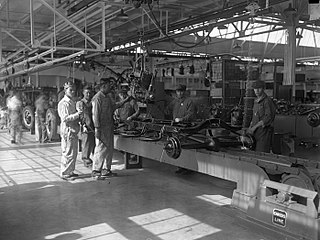Related Research Articles

A chemist is a scientist trained in the study of chemistry. Chemists study the composition of matter and its properties. Chemists carefully describe the properties they study in terms of quantities, with detail on the level of molecules and their component atoms. Chemists carefully measure substance proportions, reaction rates, and other chemical properties. The word 'chemist' is also used to address Pharmacists in Commonwealth English.

Management is the administration of an organization, whether it is a business, a not-for-profit organization, or government body. Management includes the activities of setting the strategy of an organization and coordinating the efforts of its employees to accomplish its objectives through the application of available resources, such as financial, natural, technological, and human resources. The term "management" may also refer to those people who manage an organization - individually: managers.
Project management is the practice of initiating, planning, executing, controlling, and closing the work of a team to achieve specific goals and meet specific success criteria at the specified time. The primary challenge of project management is to achieve all of the project goals within the given constraints. This information is usually described in project documentation, created at the beginning of the development process. The primary constraints are scope, time, quality and budget. The secondary—and more ambitious—challenge is to optimize the allocation of necessary inputs and apply them to meet pre-defined objectives.

Systems engineering is an interdisciplinary field of engineering and engineering management that focuses on how to design and manage complex systems over their life cycles. At its core, systems engineering utilizes systems thinking principles to organize this body of knowledge. The individual outcome of such efforts, an engineered system, can be defined as a combination of components that work in synergy to collectively perform a useful function.
Information systems (IS) are formal, sociotechnical, organizational systems designed to collect, process, store, and distribute information. In a sociotechnical perspective, information systems are composed by four components: task, people, structure, and technology.

Stagecraft is the technical aspect of theatrical, film, and video production. It includes constructing and rigging scenery; hanging and focusing of lighting; design and procurement of costumes; make-up; stage management; audio engineering; and procurement of props. Stagecraft is distinct from the wider umbrella term of scenography. Considered a technical rather than an artistic field, it is primarily the practical implementation of a scenic designer's artistic vision.
Change management is an IT service management discipline. The objective of change management in this context is to ensure that standardized methods and procedures are used for efficient and prompt handling of all changes to control IT infrastructure, in order to minimize the number and impact of any related incidents upon service. Changes in the IT infrastructure may arise reactively in response to problems or externally imposed requirements, e.g. legislative changes, or proactively from seeking improved efficiency and effectiveness or to enable or reflect business initiatives, or from programs, projects or service improvement initiatives. Change management can ensure standardized methods, processes and procedures which are used for all changes, facilitate efficient and prompt handling of all changes, and maintain the proper balance between the need for change and the potential detrimental impact of changes.
Software deployment is all of the activities that make a software system available for use.

Operations management is an area of management concerned with designing and controlling the process of production and redesigning business operations in the production of goods or services. It involves the responsibility of ensuring that business operations are efficient in terms of using as few resources as needed and effective in terms of meeting customer requirements. Operations management is primarily concerned with planning, organizing and supervising in the contexts of production, manufacturing or the provision of services.
Event management is the application of project management to the creation and development of large-scale events such as festivals, conferences, ceremonies, weddings, formal parties, concerts, or conventions. It involves studying the brand, identifying its target audience, devising the event concept, and coordinating the technical aspects before actually launching the event.
Software project management is an art and science of planning and leading software projects. It is a sub-discipline of project management in which software projects are planned, implemented, monitored and controlled.
A theatrical technician, is a person who operates technical equipment and systems in the performing arts and entertainment industry. In contrast to performers, this broad category contains all "unseen" theatrical personnel who practice stagecraft and are responsible for the logistic and production-related aspects of a performance including designers, operators, and supervisors. Many professional designers and technicians consider the diminutive "techie" to be offensive.
Industrial technology is the use of engineering and manufacturing technology to make production faster, simpler and more efficient. The industrial technology field employs creative and technically proficient individuals who can help a company achieve efficient and profitable productivity.
Sales management is a business discipline which is focused on the practical application of sales techniques and the management of a firm's sales operations. It is an important business function as net sales through the sale of products and services and resulting profit drive most commercial business. These are also typically the goals and performance indicators of sales management.
Management is a type of labor but with a special role-coordinating the activities of inputs and carrying out the contracts agreed among inputs, all of which can be characterized as "decision making". Managers usually face disciplinary forces by making themselves irreplaceable in a way that the company would lose without them. A manager has an incentive to invest the firm's resources in assets whose value is higher under him than under the best alternative manager, even when such investments are not value-maximizing.
In the Petroleum industry, Integrated operations (IO) refers to the integration of people, disciplines, organizations, work processes and information and communication technology to make smarter decisions. In short, IO is collaboration with focus on production.

Industrial engineering is an engineering profession that is concerned with the optimization of complex processes, systems, or organizations by developing, improving and implementing integrated systems of people, money, knowledge, information, equipment, energy and materials.
Applied engineering is the field concerned with the application of management, design, and technical skills for the design and integration of systems, the execution of new product designs, the improvement of manufacturing processes, and the management and direction of physical and/or technical functions of a firm or organization. Applied-engineering degreed programs typically include instruction in basic engineering principles, project management, industrial processes, production and operations management, systems integration and control, quality control, and statistics.
Production management may refer to:
Industrial and production engineering (IPE) is an interdisciplinary engineering discipline that includes manufacturing technology, engineering sciences, management science, and optimization of complex processes, systems, or organizations. It is concerned with the understanding and application of engineering procedures in manufacturing processes and production methods. Industrial engineering dates back all the way to the industrial revolution, initiated in 1700s by Sir Adam Smith, Henry Ford, Eli Whitney, Frank Gilbreth and Lilian Gilbreth, Henry Gantt, F.W. Taylor, etc. After the 1970s, industrial and production engineering developed worldwide and started to widely use automation and robotics. Industrial and production engineering includes three areas: Mechanical engineering, industrial engineering, and management science.
References
| This theatre-related article is a stub. You can help Wikipedia by expanding it. |